
The Ertzaintza is the autonomous police force for the Basque Country, largely replacing the Spanish Policía Nacional and Guardia Civil. An Ertzaintza member is called an ertzaina.

The Obelisco de Buenos Aires is a national historic monument and icon of Buenos Aires. Located in the Plaza de la República in the intersection of avenues Corrientes and 9 de Julio, it was erected in 1936 to commemorate the quadricentennial of the first foundation of the city.

The Government Palace, also known as the House of Pizarro, is the seat of the executive branch of the Peruvian government, and the official residence of the president of Peru. The palace is a stately government building, occupying the northern side of the Plaza Mayor in Peru's capital city, Lima. Set on the Rímac River, the palace occupies the site of a very large huaca that incorporated a shrine to Taulichusco, the last kuraka of Lima.
Law enforcement in Peru is carried out by two organizations under the direction of the Ministry of the Interior:

The Monument to the Fallen for Spain or the Monument to the Heroes of the Second of May, popularly known as el Obelisco, is a war memorial in Madrid, Spain. It lies on the centre of the Plaza de la Lealtad.
There are many landmarks in Buenos Aires, Argentina, some of which are of considerable historical or artistic interest.

The Plaza de Castilla is a roundabout in the north of Madrid, Spain.
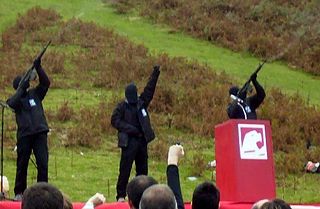
The Basque conflict, also known as the Spain–ETA conflict, was an armed and political conflict from 1959 to 2011 between Spain and the Basque National Liberation Movement, a group of social and political Basque organizations which sought independence from Spain and France. The movement was built around the separatist organization ETA, which had launched a campaign of attacks against Spanish administrations since 1959. ETA had been proscribed as a terrorist organization by the Spanish, British, French and American authorities at different moments. The conflict took place mostly on Spanish soil, although to a smaller degree it was also present in France, which was primarily used as a safe haven by ETA members. It was the longest running violent conflict in modern Western Europe. It has been sometimes referred to as "Europe's longest war".

The "Mariscal Domingo Nieto" Cavalry Regiment Escort is the Household Cavalry and Dragoon Guards regiment of the Peruvian Army since 1904, having been inactive from 1987 to 2012.
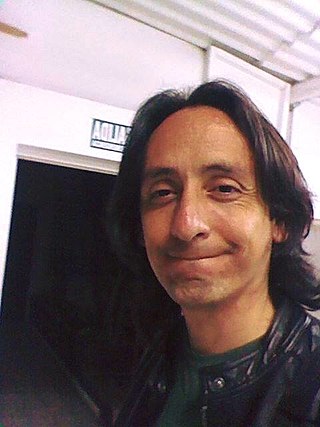
Sadiel Cuentas is a Peruvian composer of contemporary classical music.
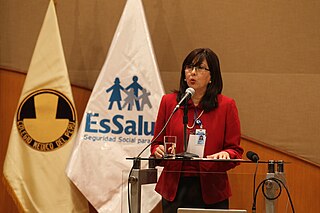
Yolanda Carolina Falcón Lizaraso is a lawyer and official from Peru. She was an agent from the Defensoría del Pueblo of the regions La Libertad and Callao and Ensured's Defender of Seguro Social de Salud del Perú. Since 1983, she has worked as a lawyer and specializes in the defense of rights, management conflict and public health.
ADÑ–Spanish Identity, also known as FE de las JONS–Alternativa Española–La Falange–Democracia Nacional, is a Spanish political coalition created for the 2019 European Parliament election.
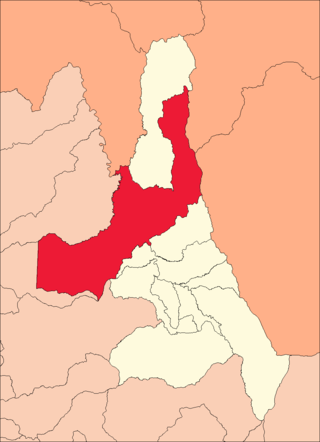
The Aucayacu massacre was a selective massacre that occurred on 6 August 1986 in the Peruvian city of Aucayacu (Huánuco). The attack was directed at gay men and sex workers. Those responsible for the attack were members of the Shining Path, a terrorist group, during the internal conflict in Peru.

Democracy Square is a road junction and public space in barrio Tres Cruces of Montevideo, Uruguay.

Democracy Square is a public square in the Historic Centre of Lima, Peru. It is located on the former site of the Bank of the Nation Building, which burned down in the year 2000 during the Four Quarters March. The park's address is 1045 Nicolás de Piérola Avenue.
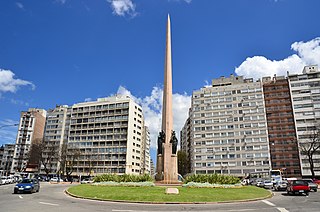
The 1983 Uruguayan pro-democracy demonstration, known as Acto del Obelisco was a massive demonstration held at the Obelisk of the Constituents, Montevideo, Uruguay, on November 27, 1983. The objective of the act was to demand the end of the civil-military dictatorship and the holding of democratic elections. At the event, the only speaker, actor Alberto Candeau, read the proclamation, in which he called for a democratic transition.

The Flag Square is a public square in Lima, Peru. It is located next to the Mateo Salado Huaca at the intersection of Breña, Lima and Pueblo Libre districts.

The Monument to the Defenders of the Border is a commemorative sculptural complex located in the Campo de Marte in Lima, Peru. Its author was the Peruvian sculptor Artemio Ocaña. It was erected between 1944 and 1945 in honor of those who fell during the Ecuadorian–Peruvian War of 1941.

The Special Intelligence Group was an elite unit of the National Police of Peru created within its National Directorate Against Terrorism with the purpose of locating and capturing the leadership bodies of terrorist groups operating since 1980: the Shining Path and the Túpac Amaru Revolutionary Movement.


















